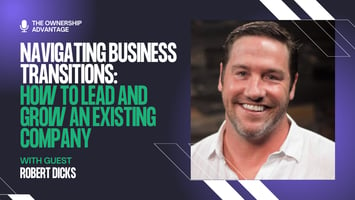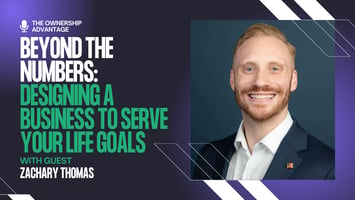In a world overflowing with strategies for scaling businesses and building high-performing teams,...
Letting Go to Grow: Scaling, Identity, and the True Meaning of Ownership
Introduction: The Growing Pains of Success
For most entrepreneurs, the leap from founder to scaling CEO means more than spreadsheets and hiring sprees—it means an existential shift that is both thrilling and unnerving. In the latest episode of The Ownership Advantage, host Tanner sits down with Bart Davis, co-founder and CEO of 512 Financial, to explore what it really takes to scale a business. Davis shares candid lessons on letting go, building teams, navigating acquisitions, and how ownership evolves as the company outgrows its creator.
Losing Control to Gain Momentum
One of the most poignant moments in the episode arrives when Tanner asks Bart what he “had to let die” to allow the company to expand. Bart’s response reflects a deep honesty many leaders often hesitate to admit: “I have lost some of the detailed business context that I had once upon a time, which is both relieving and terrifying at the same time.” As companies grow, founders must shed direct control and detailed oversight, choosing instead to trust new leaders and systems. Bart’s admission that it’s “challenging and scary” demonstrates the emotional labor required to grow a company beyond one’s individual capacity.
Building Leadership Layers: Why Personal Relationships Have to Change
Prior to scaling, Bart managed everyone at the business directly. But with expansion came the shift to a layered organization, handing direct reports from himself to new managers and directors. “You have personal relationships with these people and it feels like you’re somehow letting them down,” he admits, reflecting on the inevitable distance that scaling imposes. Yet, as he’s realized, these changes actually benefit employees, providing them with more attentive leadership and support.
Despite the gains, Bart is transparent: “If [letting go] gets easier, I haven’t gotten there yet.” This vulnerability will resonate with any founder who’s felt the bittersweet mix of pride and loss that comes with building something bigger than themselves.
From Organic Growth to Acquisition: Accelerating Scale and Capabilities
A major theme of the podcast revolves around 512 Financial’s strategic shift from organic, incremental hiring to making two key acquisitions. Bart describes these moves as “an accelerant at the very least,” enabling the company to enter new markets, add varied skill sets, and serve much larger clients virtually overnight. Acquisitions, he notes, allow simultaneous leaps in geography, capability, and customer base—changes that would have taken years otherwise.
But with new teams and cultures merging, the challenge shifts from deal-making to integration, where people and core values matter most. Davis meticulously walked new team members through the company’s core values and ensured job continuity, stating, “Putting people at ease in times of change was very, very intentional.” The trust and transparency embedded in these integrations have paid off, with nearly all acquired staff and customers choosing to stay.
The Evolving Role of the Founder: Identity, Mentorship, and Letting Others Lead
Bart credits his ability to navigate these transitions to his co-founder and mentor, Joel Trammell. Joel’s outside perspective and executive experience helped Bart focus on what the company needed at each stage, not just what he personally preferred. Bart’s willingness to let others drive process improvement (“I am not good at that stuff,” he jokes) has allowed 512 Financial to institutionalize systems that can scale beyond his individual oversight.
This delegation extends all the way to setting ambitious company targets, with Bart candidly admitting his goals were too low three years ago—and vowing to dream even bigger now.
Ownership and Transparency: Reframing What It Means to be an Owner
For Bart, modern ownership means accepting that “the buck stops here,” taking responsibility for decisions, both good and bad. It also means sharing the fruits of success, like guaranteeing a floor on profit-sharing during times of investment-heavy growth. Transparency, he explains, isn’t just about financial numbers—“I might make the wrong decision sometimes, and if or when I do, I’ll explain to [the team] that I made a wrong decision and what corrective action I took.”
Conclusion: The Ownership Advantage is Letting Go
Bart’s journey with 512 Financial is a portrait in leadership evolution. True ownership isn’t about being everywhere or doing everything; it’s about creating a business that can thrive without your hand in every detail, while inspiring trust through transparency and values. As he and Tanner discuss, when you let go of control, you gain the ability to dream—and scale—bigger than you ever imagined.
Connect with Bart HERE
Check out the full episode on YouTube HERE
Listen to the full episode on Apple Podcasts HERE


